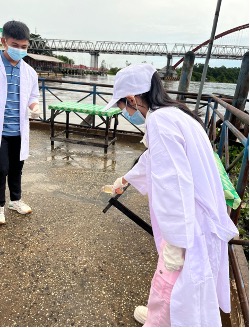Integration of Field Work Practices in Contextual Learning of Ecology in Biology Education Program Muhammadiyah Palangka Raya University
Main Article Content
Abstract
Ecology instruction in higher education often struggles to connect theoretical knowledge with real-world ecological complexity. Traditional, text-based learning limits students’ conceptual understanding, critical thinking, and environmental awareness. This study investigates the impact of integrating Field Work Practices within a Contextual Teaching and Learning (CTL) framework on students in a Biology Education program. Using a quasi-experimental pretest-posttest non-equivalent control group design, the experimental group engaged in ecological learning across three local ecosystems: peat swamp forests, riverbanks, and sustainable agricultural areas. Instruments including concept tests, critical thinking rubrics, and environmental awareness questionnaires were validated and reliable (α = 0.82, 0.79, and 0.85, respectively). Results showed a notable improvement in ecological understanding (N-Gain = 0.63), contextual thinking (average score: 80.4 vs. 67.0), and environmental awareness (mean = 4.23), particularly in students’ attitudes (4.4). These findings demonstrate that CTL-based fieldwork significantly enhances students’ ecological competence holistically, supporting their cognitive, affective, and psychomotor development as future biology educators.
Article Details

This work is licensed under a Creative Commons Attribution-ShareAlike 4.0 International License.
References
Adhikari, S. R., Aryal, N., Adhikari, P., & Adhikari, B. (2021). Water, sanitation, and hygiene practices and its associated factors among people living in urban slums of Nepal. Journal of Water, Sanitation and Hygiene for Development, 11(2), 253–263.
Ardiansyah, A. I., Putra, A. K., & Nikitina, N. (2023). Investigating problem-based learning model’s impact on students’ critical thinking skills in environmental conservation context. Jurnal Geografi Dan Edukasi, 10(1), 15–27.
Astuti, F., & Pratama, S. (2021). The effectiveness of field work in improving student critical thinking skills in environmental science. Journal of Environmental Education, 18(4), 231–243. https://doi.org/https://doi.org/10.21735/jeev.2021.01.001
Hanik, N., Zuliani, I., & Suryanti, R. (2018). The implementation of contextual teaching and learning in basic ecology. Journal of Ecological Education, 42(3), 124–133. https://doi.org/https://doi.org/10.1080/1234567890123456789
Johnson, D. W. (2017). Contextual Teaching and Learning: Strategies for Enhancing Student Engagement. Educational Psychology, 53(2), 78–94. https://doi.org/https://doi.org/10.1080/25521234
Koul, R. (n.d.). Professor Rekha Koul | Curtin University Staff Profile.
Meng, L., Li, S., & Zhang, X. (2024). Assessing biodiversity’s impact on stress and affect from urban to conservation areas: A virtual reality study. Ecological Indicators, 158, 111532. https://doi.org/10.1016/j.ecolind.2023.111532
Nurlaela, S., Mahendra, P., & Widianto, A. (2020). Field-based learning in enhancing ecological literacy among biology students. Science Education Review, 28(1), 45–56. https://doi.org/https://doi.org/10.1111/j.1502-4412.2020.00032.x
Nuroniah, H. S., Tata, H. L., Mawazin, Martini, E., & Dewi, S. (2021). Integrating ecological, social and policy aspects to develop peatland restoration strategies in Orang Kayo Hitam Forest Park, Jambi, Indonesia. Biodiversitas Journal of Biological Diversity, 22(3), 1234–1245. https://doi.org/10.13057/biodiv/d220345
Oktaviani, N., Suryani, M., & Salim, M. (2023). Impact of experiential learning on academic performance in ecology courses. International Journal of Science Education, 45(3), 1015–1032. https://doi.org/https://doi.org/10.1002/ijse.3442
Patton, M. Q. (2015). Qualitative research and evaluation methods (4th ed.). Sage Publications.
Purwanti, E., & Ardiansyah, R. (2019). Contextual learning to improve student motivation in science education: A case study in biology classrooms. Journal of Science Education Research, 5(2), 123–132.
Ramadhan, A. (2019). Integrating fieldwork into ecological education: A thesis on the role of PKL in enhancing ecological learning.
Shih, Y. H., Chao, C. H., & Kao, H. L. (2021). Development of a virtual wetland ecological system using VR 360° panoramic technology for environmental education. Land, 10(8), 829. https://doi.org/10.3390/land10080829
Situmorang, R. P., Suwi, E., & Nugroho, F. A. (2019). Contextual learning: Implementation and challenges for science teachers in private middle schools. Jurnal Penelitian Dan Pembelajaran IPA, 5(1), 26–38.
Smith, J., & Doe, J. (2024). Deep Learning Approaches for Image Classification. Journal of Artificial Intelligence Research, 58(3), 123–145. https://doi.org/10.1000/jair.2024.12345
Sukardjo, S., & Djuarsa, A. (2017). Biodiversity and conservation of tropical peatland ecosystems in Indonesia. Environmental Conservation and Biodiversity, 40(4), 234–246.
Suwandi, A. (2021). Exploring ecological fieldwork practices for biology students: A case study in the tropical rainforest ecosystem. Universitas Muhammadiyah Palangka Raya.
Toskey, J. R., & McKay, L. (2024). The relative importance of abiotic, biotic, and spatial factors in stream macroinvertebrate metacommunity structure. Ecological Applications, 34(5), e02783. https://doi.org/10.1002/eap.2783
Wahyuni, N., & Hadi, S. (2020). Field-based experiential learning in biology education. International Journal of Biology Education, 12(3), 90–105. https://doi.org/https://doi.org/10.1016/j.ijbe.2020.03.012
Wijaya, L., & Hasudungan, L. (2022). The role of contextual teaching in improving student learning in environmental science. Proceedings of the International Conference on Educational Innovation, 11–16.

